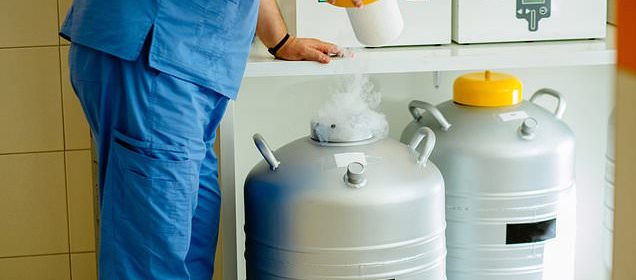Cure infertility by freezing men's testicles, say scientists

Frozen testicular tissue still viable after TWO DECADES, find scientists in breakthrough that could allow cancer-stricken boys to have children
- Scientists were able to kick-start production of healthy sperm in infertile mice
- Used cells responsible for sperm production that had been frozen for 23 years
- Find gives hope for treating infertile men who were treated for cancer as boys
Reimplanting cryogenically frozen testicle cells into infertile men could give them the ability to conceive again, a study suggests.
Scientists were able to kick-start the production of healthy sperm in infertile mice inserted with testicular tissue harvested 20 years earlier.
Previous research on monkeys had shown it was possible using cells frozen for months — but the latest study suggests long-term freezing is also viable.
The find could pave the way for a new type of treatment for pre-pubescent boys with cancer, who are often made infertile by powerful drugs used to treat the disease.
Adult men in the UK and US can pay to have their sperm frozen, but young boys who cannot produce functional sperm yet have little options to preserve their fertility.
In 2019, the first macaque was born using cryogenically preserved testis cells in an important breakthrough for getting human trials approved.
Reimplanting cryogenically frozen testicle cells into infertile men could give them the ability to conceive again, a study suggests (stock)
There are no mature sperm inside young boys’ testicles but there are lots of ‘sperm stem cells’. These cells produce sperm but only after puberty.
The latest study involved sperm stem cells that had been extracted from rodents.
They had been frozen for three different time periods — 23 years, up to four months and one day.
Indian surgeon plans to transplant womb into a TRANS woman in world-first op
A surgeon in India will attempt to transplant a womb into a trans woman who was born a man — with the view to making them pregnant.
The risky procedure will involve taking the reproductive organs from a dead donor or a patient who has transitioned the other way and had theirs removed.
There has only been one documented case of a womb being inserted into a trans woman in the past — but she died from complications just months later.
Impregnating a trans woman would be an even bigger feat, and would require the use of IVF and a C-section, because they do not have a fully functioning vagina.
Dr Narendra Kaushik, who runs a gender reassignment clinic in New Delhi, has said he is ‘very, very optimistic’ he can make a success of the procedure.
The cells were kept in liquid nitrogen to prevent the natural breakdown that happens when biological tissue is removed from the body.
They were then injected into mice which had been genetically engineered to prevent their bodies from rejecting the foreign tissue.
All three groups went on to generate viable sperm within months of the transplant.
However, cells that had been frozen for years were less robust than those preserved for shorter periods.
Mice that received cells frozen for more than 20 years made fewer elongating spermatids, which go on to form swimming sperm.
But importantly ‘viability is by no means lost during long-term cryopreservation’, according to the team from the University of Pennsylvania.
Dr Eoin Whelan, a stem cell expert and lead researcher, said: ‘Our study showed that rat spermatogonial stem cells can be successfully frozen for over 20 years, transplanted into an infertile recipient animal and regenerate the ability to produce sperm, albeit at a reduced rate.
‘This could provide a method to recover the loss of fertility in prepubertal boys treated for cancer.’
The researchers say the find is more important than ever because child cancer survival rates have improved in recent decades.
In the UK, the five-year survival rate for all types of cancer has soared from 36 per cent to 84 per cent since the 1970s due to treatment advances.
While clearly a step in the right direction, one of the most serious side effects of modern treatments is a loss of fertility.
Chemotherapy — especially alkylating drugs — can damage sperm in men and sperm-forming cells, known as germ cells, in young boys.
Radiotherapy can also lower sperm counts and testosterone levels.
The study was published in the journal PLOS Biology.
Testicular tissue harvesting has been available on the NHS as part of a trial at a limited number of sites since 2015.
It is offered as an ‘experimental’ technology to boys about to go through cancer treatment that could impact their fertility.
It is not clear how many patients have had the tissue reimplanted after turning 18.
And to date there are no known cases of a child being born to someone who was reimplanted with testicular cells that were cryogenically frozen.
Source: Read Full Article
